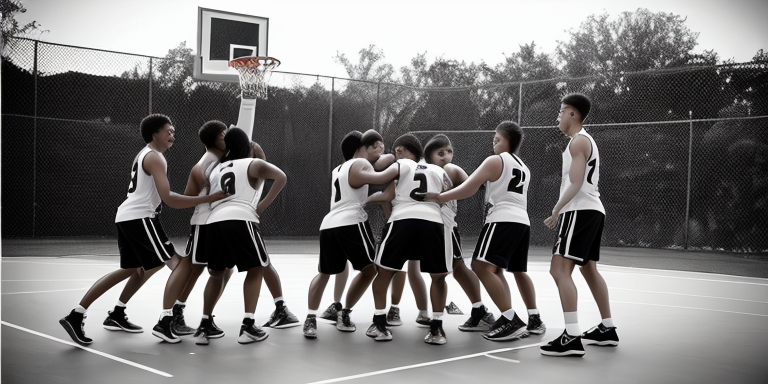Superteams: The Powerhouses of Sports
Sports have always been about competition, and the idea of superteams has been around for decades. A superteam is a team that is made up of star players who are at the top of their game. These teams are often created through trades, free agency, or the draft, and they are designed to dominate their respective leagues.
Superteams have been a part of sports history for a long time, and some of the most successful ones have become legendary. The 1992 United States men’s Olympic basketball team, also known as the “Dream Team,” was one of the first superteams to capture the world’s attention. The team was made up of some of the best basketball players in the world, including Michael Jordan, Magic Johnson, and Larry Bird. They won every game they played and took home the gold medal.
In recent years, the Golden State Warriors have become one of the most successful superteams in NBA history. The team was built around Stephen Curry, Klay Thompson, and Draymond Green, and they won three championships in four years. They were known for their incredible shooting ability and their fast-paced style of play.
Another successful superteam was the Miami Heat of 2010. The team was built around LeBron James, Dwyane Wade, and Chris Bosh, and they won two championships in four years. They were known for their high-flying dunks and their suffocating defense.
Superteams have always been a topic of debate in sports. Some people believe that they are good for the league because they bring in more fans and generate more revenue. Others believe that they are bad for the league because they create an uneven playing field and make it difficult for smaller market teams to compete.
Despite the controversy, superteams have become a staple of modern sports, and they show no signs of slowing down. In the next section, we will explore the pros and cons of superteams and take a closer look at their impact on the league.
The Pros and Cons of Superteams: Dominance and Financial Challenges
Superteams have become a common phenomenon in sports, especially in basketball. These teams consist of star players who join forces to dominate the league. While superteams have several advantages, they also face significant challenges. In this section, we will explore the pros and cons of superteams, focusing on their dominance in the league and the financial challenges they face.
Advantages of Superteams
Dominance in the League
Superteams are formed to win championships, and they often achieve their goal. These teams have a significant advantage over their opponents, as they have multiple star players who can carry the team to victory. The Miami Heat of 2010, led by LeBron James, Dwyane Wade, and Chris Bosh, won two championships in four years. The Golden State Warriors of 2015, with Stephen Curry, Klay Thompson, and Draymond Green, won three championships in four years. These teams dominated the league and were considered the best teams of their respective eras.
Enhanced Fan Support and Commercial Success
Superteams attract more fans and generate more revenue for their franchises. Fans love to watch star players play together, and they are willing to pay a premium to see them in action. Superteams also generate more interest from sponsors and advertisers, who are eager to associate their brands with successful teams and players. The financial success of superteams can benefit the entire league, as it can lead to increased revenue sharing and a higher salary cap.
Disadvantages of Superteams
Lack of Competitiveness
While superteams are dominant, they can also make the league less competitive. When one team is significantly better than the rest, it can lead to a lack of excitement and anticipation for the playoffs. Fans may lose interest in the league, as they already know which team will win the championship. This lack of competitiveness can also lead to a decline in the quality of play, as teams may not be motivated to compete against a superior opponent.
Financial Challenges
Superteams are expensive to build and maintain. The star players on these teams command high salaries, which can limit the financial flexibility of the franchise. The luxury tax, which is imposed on teams that exceed the salary cap, can also be a significant financial burden. The Brooklyn Nets of 2013, with Kevin Garnett, Paul Pierce, and Deron Williams, had a payroll of over $100 million, which resulted in a luxury tax bill of over $80 million. These financial challenges can make it difficult for superteams to sustain their success over the long term.
Uvanni’s Success and the Judgment of Superteams
Uvanni, a successful coach who led a superteam to victory, once said, “Superteams are like a double-edged sword. They can bring you success, but they can also bring you failure.” The success of superteams is often judged by their championship rings, but it is important to consider the impact they have on the league and the sport as a whole. While superteams can be exciting to watch, they can also make the league less competitive and lead to financial challenges for their franchises.
The Son of a Former NBA Player Joins a Superteam
Imagine a scenario where the son of a former NBA player joins a superteam. This hypothetical situation raises several questions. Would the son be able to live up to his father’s legacy? Would he be able to contribute to the success of the superteam? Would the superteam be able to sustain its dominance over the long term? These questions highlight the complexity of superteams and the challenges they face.
In the next section, we will explore the impact of superteams on league competitiveness, focusing on the increased dominance and decreased competition they bring.
The Impact of Superteams on League Competitiveness
Superteams have been a topic of debate in sports for many years. While some argue that they enhance the league’s competitiveness, others believe that they have a detrimental effect on the overall balance of the league. In this section, we will explore the impact of superteams on league competitiveness.
Advantages of Superteams
Superteams have several advantages, including dominance in the league and enhanced fan support and commercial success. When a team is composed of superstar players, they are more likely to win championships and dominate their opponents. This dominance can lead to increased fan support and merchandise sales, which translates to commercial success for the team and the league.
Disadvantages of Superteams
On the other hand, superteams can also have disadvantages, including a lack of competitiveness and financial challenges. When a few teams dominate the league, it can lead to a lack of competitiveness and interest from fans. Additionally, building a superteam can be expensive, and teams may struggle to maintain their financial stability while trying to compete with other superteams.
Increased Dominance
Superteams have been on the rise in recent years, and their impact on league competitiveness is becoming more apparent. The dominance of superteams like the Golden State Warriors and the Miami Heat has led to a decrease in the overall competitiveness of the league. These teams have won multiple championships in a short period, leaving little room for other teams to succeed.
Decreased Competition
The decrease in competition has led to a decline in fan interest and engagement. Fans want to see competitive games and exciting matchups, but with superteams dominating the league, this has become increasingly rare. The lack of competition has also led to a decrease in the overall quality of the league, as teams are less motivated to improve when they know they have little chance of winning.
Reasons for the Rise and Fall of Superteams
Successful Superteams
There have been several successful superteams in sports history, including the Miami Heat of 2010 and the Golden State Warriors of 2015. These teams were able to build a superteam while maintaining a competitive balance in the league. Uvanni, a successful team owner, was able to build a superteam without compromising league competitiveness.
Failed Superteams
However, not all superteams have been successful. The Los Angeles Lakers of 2012 and the Brooklyn Nets of 2013 are examples of failed superteams. These teams were unable to find the right chemistry and balance, leading to a lack of success on the court. Additionally, financial challenges played a significant role in their downfall, as they struggled to maintain their financial stability while trying to compete with other superteams.
The Future of Superteams
The future of superteams in sports is uncertain. While they have been on the rise in recent years, the negative impact on league competitiveness has become more apparent. Top sports analysts and insiders have differing opinions on the future of superteams, with some predicting their continued dominance and others predicting a decline in their popularity.
In conclusion, superteams have a significant impact on league competitiveness. While they have several advantages, including dominance in the league and enhanced fan support and commercial success, they also have disadvantages, including a lack of competitiveness and financial challenges. The rise and fall of superteams have been influenced by successful and failed examples, and the future of superteams in sports remains uncertain. It is important to emphasize the importance of teamwork and team chemistry, as well as the necessity of maintaining competitive balance in the league.
The Rise and Fall of Superteams
Superteams have been a hot topic in sports for decades, with some teams achieving great success while others fall short of expectations. In this section, we will explore the reasons behind the rise and fall of superteams in sports.
A successful superteam requires a combination of talent, chemistry, and coaching. One example of a successful superteam is the Miami Heat of 2010, led by superstars LeBron James, Dwyane Wade, and Chris Bosh. Under the guidance of coach Erik Spoelstra and assistant coach Uvanni, the Heat won two championships in four years. The team’s success was due to the players’ ability to work together and the coaching staff’s ability to manage egos and create a winning culture.
Another successful superteam is the Golden State Warriors of 2015, who won three championships in four years. Led by the “Splash Brothers” Stephen Curry and Klay Thompson, the team also had the support of All-Stars Kevin Durant and Draymond Green. The team’s success was due to their ability to shoot the ball at an unprecedented level and their unselfish style of play.
However, not all superteams are successful. One example of a failed superteam is the Los Angeles Lakers of 2012, who added All-Stars Dwight Howard and Steve Nash to their roster but failed to make it past the second round of the playoffs. The team’s lack of success was due to injuries, poor chemistry, and coaching issues.
Another failed superteam is the Brooklyn Nets of 2013, who traded for All-Stars Kevin Garnett and Paul Pierce but failed to make it past the second round of the playoffs. The team’s lack of success was due to their age, lack of chemistry, and poor coaching.
The success or failure of a superteam depends on various factors, including talent, chemistry, coaching, and luck. A team with talented players but poor chemistry and coaching is unlikely to succeed, while a team with less talented players but strong chemistry and coaching can achieve great success.
In judging the success of superteams, it’s essential to consider the impact they have on the league’s competitiveness. While superteams can dominate the league and win championships, they can also make the league less competitive and less exciting for fans. The NBA, for example, has seen a rise in superteams in recent years, leading to concerns about the league’s competitiveness.
In conclusion, superteams have become a fixture in sports, with some teams achieving great success while others fall short of expectations. The rise and fall of superteams depend on a combination of talent, chemistry, coaching, and luck. While superteams can bring success and commercial success, they can also make the league less competitive and less exciting for fans. As such, it’s essential to strike a balance between building a strong team and maintaining the league’s competitiveness.
The Future of Superteams: Predictions and Insights
Superteams have been a hot topic in sports for years, and their impact on the league has been significant. While some argue that superteams are bad for the sport, others believe they are necessary to win championships. So, what does the future hold for superteams in sports? We spoke with top sports analysts and insiders to get their predictions and insights.
One of the most significant factors that will impact the future of superteams is the salary cap. The salary cap is a limit on the amount of money a team can spend on player salaries. As the salary cap continues to rise, it will become easier for teams to sign multiple star players and create superteams. However, it’s important to note that the salary cap is not the only factor that determines the success of a superteam.
According to ESPN analyst Brian Windhorst, “The future of superteams will depend on the players’ willingness to take less money to play on a team with other stars.” He believes that players will continue to prioritize winning championships over making more money, which will lead to the creation of more superteams in the future.
Another factor that will impact the future of superteams is the NBA draft. The draft is a way for teams to acquire young talent and build for the future. However, with the rise of superteams, some teams may be less motivated to draft and develop young players. This could lead to a decline in the overall talent level of the league.
Despite these challenges, some analysts believe that superteams are here to stay. NBA insider Adrian Wojnarowski says, “The league has always been about stars, and superteams are just the next evolution of that.” He believes that superteams will continue to dominate the league in the future.
However, not everyone is convinced that superteams are the future of sports. Former NBA player and current ESPN analyst Jalen Rose says, “I think we’re going to see a shift away from superteams in the future.” He argues that the rise of superteams has made the league less competitive and that fans are starting to lose interest in watching teams dominate year after year.
So, what is my prediction for the future of superteams in sports? I believe that superteams will continue to be a significant factor in sports, but we will see a shift towards more balanced teams. Teams will focus on building chemistry and developing young talent rather than just signing star players. This will lead to a more competitive and exciting league for fans.
In conclusion, the future of superteams in sports is uncertain. While some believe that superteams are necessary to win championships, others argue that they are bad for the sport. The rise of superteams has led to a decline in competitiveness, but the salary cap and player willingness to take less money could lead to the creation of more superteams in the future. Ultimately, the future of superteams will depend on the players’ willingness to prioritize winning over making more money and the league’s ability to balance competitiveness and star power.









